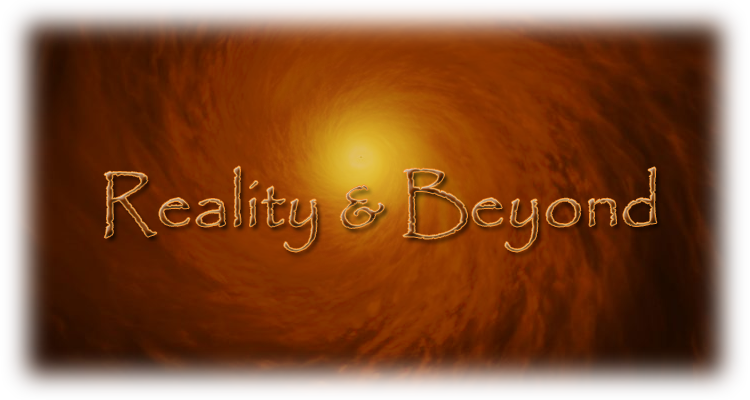
I read something in Second Life (a virtual world) today on someone's profile page. She (or possibly he) wrote, "The only thing that is real in Second Life is feelings." I suspect she assumes that the feelings are attached to "real" people outside the computers. So, feelings are real and everything else in Second life is pixels, and pixels ultimately are just excited dots of energy on a computer screen. Ideas are what we manifest there — ideas of objects or people or whatever we fancy. They appear to have three dimensions, but that's just an illusion on a flat two-dimensional screen. Wait... they also have the dimension of linear time — or appear to do so. If I think too much about this, it may give me a headache. In a "real" world where there seems to be a huge muddle about the differences between truth and opinion and reality and belief and experience, I think this may be important — this idea that only feelings are real. I do know this was only being said about "virtual world" that only exists inside a computer. But I'm not so sure about the "reality" of our world where a lot of people seem to feel that there is no truth and that only opinions matter, and one person's opinions matter just as much as any others — which seems to soon turn into a sort of "my way or the highway" kind of thinking, where the biggest gun matters the most. Think about it. Physicists believe that everything is composed of sub-atomic pixels sorry, particles. These are said to be tiny bits of energy in a whole lot of nothing. They even have names in the Standard Model that include: Six "flavors" of quarks: up, down, bottom, top, strange, and charm; and six types of leptons: electron, electron neutrino, muon, muon neutrino, tau, tau neutrino. (I think perhaps I love physicists more than I knew — anyone who thinks up names like this has to be delightfully whimsical at least some of the time. The same is true of the philosophers who come up with an elaborate notion called the Raven Paradox, which is: The raven paradox, also known as Hempel's paradox or Hempel's ravens, is a paradox arising from the question of what constitutes evidence for a statement. Observing objects that are neither black nor ravens may formally increase the likelihood that all ravens are black even though, intuitively, these observations are unrelated. This problem was proposed by the logician Carl Gustav Hempel in the 1940s to illustrate a contradiction between inductive logic and intuition. It goes on from there quite extensively and even dizzyingly. But the whole thing is based on the concept that "all ravens are black." Any one real, actual white raven (not an albino) brings the whole structure down. And we now know there are actual white ravens, possibly recently evolved. They may not have existed in Hempel's time. But they do now, and one can no longer say "all ravens are black." Or, perhaps the physicists and the philosophers who come up with these knackerty knotions are, like the white raven, so rare as to be virtually non-existent. If you find one, perhaps you should record it carefully as proof that they do exist. Or perhaps these bursts of whimsicality escape as rarely as white ravens, promptly dissolving into vapor like brief whistles of steam from an overheated boiler. Forgive me, I get... Ooo! Shiny! Ahem. So... All of those wee bits of energy/matter would crumple into nearly nothing at all but empty space if their excitement didn't keep them spinning or whatever they really do. Now that I think about it, this sounds a lot like pixels on a screen. To understand why I say this, you can find more than I wanted to know about pixels here. Back when I first went into Second Life, I was also doing a lot of thinking about Buddha and Buddhism, and I had an interesting experience. Flying along (you can do that in Second Life) I got distracted and fell. My avatar fell ungracefully to the ground splat right on my belly. Then, without me doing a thing, she/I scrambled up onto my feet and brushed the (imaginary?) dust off. I hadn't told my avatar to do that! Then I wondered (also involuntarily, with what felt like the back of my mind looking over my shoulder) if there was someone behind me, watching me as I was watching my avatar, and if I sometimes did things that surprised it, things I hadn't been told to do. And it felt like this someone was nodding and being amused. I immediately shut Second Life down, turned the computer right off, and unplugged it, which was not something I usually did. Then, I went outside where I dug holes and planted flower bulbs until I felt like one simple, ordinary, real person again. But I remembered (and have never forgotten) that feeling of someone (me) sitting behind this me (this one that is typing), almost laughing, certainly amused at the confused typing-me and at my surprise and shock — and thoughts. Then I thought how amused the Buddha might have been if he'd seen Second Life. It so beautifully demonstrates so many of his concepts. This brings me to what I really wanted to talk about here. I've always meant to write this down and here in the liminal space-time of All Hallows' Eve seems like an appropriate time to consider Life and Death and What Comes After, especially after reading Michael Tomlinson's story about Two Men and a Dog this morning. I quote a bit from the middle: One of the men spoke of a friend of theirs who had died this year. A rich and robust character of a man, impossible to not like the instant you spotted him. "I heard him today, no shit. It was real. He was right there with me and laughing. I asked him aloud if he'd seen my mom and he just laughed really loudly in that way of his and said, 'It's not at all — ha, ha, ha, ha, ha, — nothing at all like you think it is,' and then he just laughed louder and more happily until I didn't hear him any more. I've been thinking about that all day." You know, I've gotten very similar messages from a few people. I used to do a lot of counseling and healing with people in hospice or terminally ill, and some of them came back after they'd gone on. It usually happened I was half-asleep or in deep meditation. In one instance, Vera came back to tell me, "It isn't anything like I thought it would be." Pause as she laughed. "But it isn't like you thought it would be either!" And she chuckled again. There was always that sense of wonderment and laughter — a kind of mellow, companionable chuckle or delighted laughter — and when there were words, they were always something like that. One time was different from the others. No words were involved — only scents and touches and feelings. Well, there may have been words, but not words I understood. It was about four in the morning, and one of our weeks-old kittens was dying. With both in my lap, his mother, Samantha, washed and cuddled it as he went down and down, weaker every moment. At last he gave a tiny shudder and gasp as his soul shook loose from the body. The space we were in suddenly seemed to be much larger, as if the walls, house, and land had dissolved, and in front of us dim stars and nebula formed an opening — rather like a tunnel made of light, with a brilliant light at the far end. Hidden in that star-filled glory I could hear a mother cat calling a kitten with that special purring call they use, and a warm, milky scent drifted through to us. Something in my lap (not the little dead body) stood up with a wobble and set off into the light on tiny shaky legs. As Samantha and I watched, he grew stronger and faster, calling back at the voice that called him. Then he was gone, and Samantha and I were alone in the bedroom, in the silence and the dark. Samantha leaned against me as she washed the tiny body one last time, then pressed her face against my tear-wet face and we both sighed. Slowly, she went to sit in the window and watch for the dawn. But we both knew something I can't even begin to describe. The kitten was dead. He was all right —happy, blessed, and loved. His mother's heart was broken. My heart was far from whole. That is about all I can say about the strangely twisty conflicting feelings Samantha and I both felt. From this and other experiences, I have hopefully concluded that when you die, there is someone who loves you there to meet you. But I could be wrong about this — we are not all as adorable as kittens. When I once spent ten days sitting at Death's door, there was no one waiting, no light to guide me. It was simply a wonderfully peaceful and restful place to sit and wait for whatever happened next — and I hadn't a clue what that might be and knew only that I just didn't know until I drifted back to life without any idea why the whole trip had been necessary. Recently someone asked one of those Facebook questions — if you could live forever, would you want to? I was surprised by the number of people who virtually shouted NO! Several others said "for a while" and no one said "yes" — which says pretty terrible things about the society we have created and what we are doing to our world. My own answer was, "I don't know how long I would like to live. I still have a lot more that I want to do. BUT I shall know when I'm ready to go." At 80, it is nice to be clear about that.
Copyright © 2018 by Jessica Macbeth. All rights reserved.
|
|||||


